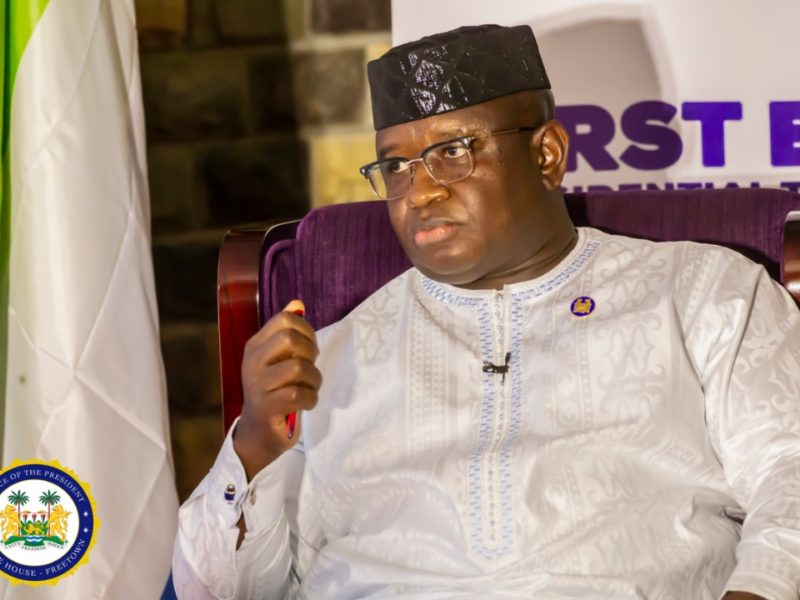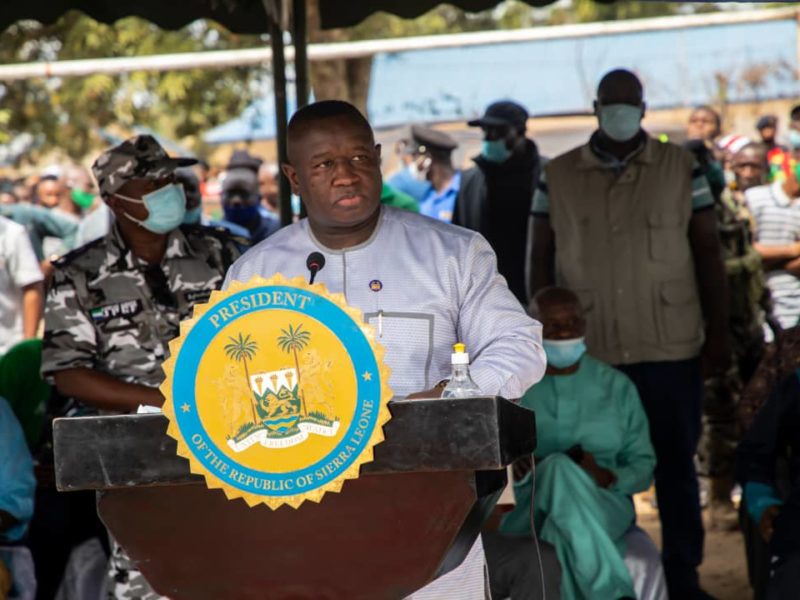Salone Conference: Transform or die!
Today or probably, in a couple of hours, Sierra Leoneans from all walks of life and friends of Sierra Leone will have the opportunity to sit together under one roof, seeking to treat many of the illnesses that have kept us in the sick bed with intravenous drips clipped to us for God knows how long.
When this Sierra Leone Conference on Development and Transformation is convened at the Miatta Conference Centre today, my daughter will certainly be in her classroom or playground at school. She is seven years old but like any other kid coming up, she has a vision. It’s her dream but she would not tell anyone. Instead, when a few days ago, an aunt asked her what she would want to be when she grew up, Aminata replied, “on my birthday, I made a wish but I won’t say it to anyone.”
However, I recall when she first met with Umaru Fofana, the President of the Sierra Leone Association of Journalists at his Campbell street office sometime back and was asked the same question, she was emphatic and without prompting, she said “I want to be the President.” Whether that has changed or not, I have no idea.
Like Aminata, Sierra Leone, as a nation has always had a vision if not visions. We have had our hopes and our dreams. In fact, it was the dream of Sir Milton Margai and others on the attainment of Independence in 1961 that this new nation was going to be prosperous. It was going to be a country with one people, united we shall stand and the hills and the valleys from Leicester Peak to Bintumani and Candy Mountain to Wusum Hills shall all be there to reecho our cries especially in moments of need.
They had also envisaged that our natural resource base, the ore in Maramapa, the diamonds excavated from the minefields in Sefadu, the cocoa farms in Pujehun and the fishes in the River Rokel and not forgetting our tourist attractions like the enviable River Number 2, rated as one of the ten most natural beaches in the world by Lonely Planet (a Travel Guide company); the famous Cotton Tree at the heart of the city with its numerous birds who would either wake the city up or send it to sleep with the shout of , “ King Property , all tin correct ,” shall be the engine for our growth.
We started off very well. We had plenty to eat and thus, no reason to rely on the Chinese or Gaddafhi or even Guinea to send us shiploads of rice. There was relative peace and stability to the extent that the Prime Minister, Sir Milton, could even stop on the beaches of Lumley to negotiate for ‘shine nose’ (fish) or barracuda with the fishermen. Papa Shaki (Siaka Stevens), they say, used to move around town in his ‘open top’ Mercedes Benz and respond to the cries of ‘Bandalay’ with, “Pass ar die” whenever some mischievous citizens tried to poke fun at him. Our nation was the beacon of academic pursuits. With Fourah Bay College and other learning institutions, we were proudly referred to as, ‘the Athens of West Africa,’ The Queen’s language was also spoken effortlessly by our educated class as if it were one of the sixteen indigenous languages. Though now moribund, our Civil Service then was crafted like that of the Brits with excellence and performance as their signature registers. Before Independence, our soldiers fought alongside the Brits during World War II and on to this day, stories abound, whether real or conjectured, of their heroics at the Burma War.
Then damnation beckoned. We stopped thinking nation first. The greed and lust for power took centre stage. The military preoccupied their minds with the thought of abandoning their barracks at Wilberforce to occupy State House. We stopped feeding ourselves. Our diamonds turned to curse rather than a blessing for us. Our standards in education and moral values dropped drastically and to crown it all, Foday Sankoh and his cohorts took to the bush. The rest is history.
Since then efforts have been made to wake us from our slumber. Injections of different varieties have been prescribed just to resuscitate or raise us from our state of comatose. In trying to cure us of some of these dreadful diseases, we wrote several papers and signed many documents or accords. These include: The Green Revolution, the Truth and Reconciliation Commission report, the Vision 2025, the Poverty Reduction Strategy Paper I and the Agenda for Change. We went to Bintumani I and II also signed the Lome, Yamoussoukro and Abidjan accords. Yes, these or rather some, were meant to heal a particular ailment but not necessarily to cure us of our major illnesses. Today we are in dire need of a sound mind in a very sound body.
Thus, to help cure Sierra Leoneans of our never ending illnesses, another conference but this time, the very first development conference aimed at charting the next fifty years forward has been convened. I can hear the pessimism, the fear or even the outcry on why another ‘per diem shop’ or ‘talking shop.’ Legitimate though some of these concerns may be, because of our past history, one may also tend to ask: Would you stop paying the school fees of your one and only child if he or she could not make the grades to be promoted to the next class?
When Reverend Martin Luther King Junior, the great American Civil Rights leader made his famous, ‘I have a dream’ speech in front of the Lincoln Memorial in Washington, probably very few Americans could have imagined they would live to see not only a black man but the son of a Kenyan occupy the White House. In the same vein, when in 1961, President John F Kennedy challenged Americans that by the end of the decade, man was going to step foot on the surface of the moon, few imagined this was possible. However, in 1969, the impossible became possible when Neil Armstrong landed on the moon.
I am sure it was this kind of belief and conviction President Ernest Bai Koroma had in his mind when on the eve of our fiftieth Independence anniversary, he suggested to the nation that it was time to rethink our development strategies with the aim of charting the next 50 years forward.
On his shoulders lies the responsibility of developing the roadmap that is expected to culminate into a Sierra Leone manifesto that will take note of issues that include but not limited to the following themes; Governance – Political and Economic, the Private sector, infrastructural Development and the Role of the Diaspora, Social Service Delivery and Managing Natural Resources.
Since September last year when they had their first Steering Committee meeting, Herbert M’cleod, the Coordinator for this huge task has worked assiduously with his team at the Secretariat to ensure that the views of ordinary folks like the Okada riders, the petty traders, farmers, our professionals and even experts who have studied the development models of Ghana, Malaysia, South Korea and Singapore have all been noted.
The tone was set through the 200 Focus Group Discussions that were held nationwide, the consultative meetings with the Disabled, the Women, Paramount Chiefs, the Youth and even Sierra Leoneans in the Diaspora. Obviously, the views depending on which group you talk to vary but it’s clear that if we want to move forward as a nation, we have to make radical changes. We have to move away from doing business as usual
M’cleod says he now has in his file a number of “key emerging transformative ideas.” I have seen them and I must say education is the foremost priority for all Sierra Leoneans. The others are also equally transformative but as usual, as a nation, we are quick to identify our problems but we have always played the usual suspect when it comes to the ‘howness’- solutions/implementation.
Though M’cleod and his team have been able to capture our views and suggestions on paper, we can only transform to attain a middle income economy – a donor-giving instead of a donor-receiving nation, a country with a literacy rate of at least 70 percent in the next seven to ten years, and a country where the minimum for women representation particularly in governance is 30 percent – if only we are prepared to own the process.
As a nation, our destiny is now in our own hands. We have what it takes to change our leaders and it is not the leaders who should change us. But the question is, are we prepared?
For me, the choice is ours – as a people, we either transform now, or we die – Think about it.
By Osman Benk Sankoh
Editor’s note: The writer, Osman Benk Sankoh was former editor – Concord Times and works with the Secretariat of the Sierra Leone Conference on Development and Transformation as its Community Outreach / Media Analyst .
Stay with Sierra Express Media, for your trusted place in news!
© 2012, https:. All rights reserved.





